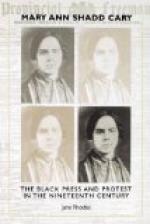Humane meals are very much like yellow-brown grass, and our clothes are on the same order as our meals. As for our days, if it wasn’t for calendars we wouldn’t know one from the other, except Sundays, for, unlike the stars mentioned by St. Paul, they differ not.
The rising-bell rings at five o’clock, and all except the very littlest get up and clean up until seven, when we march into the dining-room. At 7.25 we rise at the tap of Miss Bray’s bell, and those who have more cleaning up-stairs march out; those who clear the table and wash the dishes stay behind. At 8.30 we march into the school-room, where we have prayers and calisthenics. The calisthenics are fine. At nine we begin recitations.
We have a teacher who lives in town, Miss Elvira Strother. She’s a good teacher. The older girls help teach the little ones, and next year I’m to help.
This Asylum is over ninety (90) years old, but looks much older. There is just money enough to run it, and it hasn’t had any paint or improvements in the memory of man, except the electric lights. The town put those in for safety, and don’t charge for them.
I wish the town would put in bath-tubs for the same reason. It would make the children much nicer. They just naturally don’t like to wash, and one small pitcher of water for two girls don’t allow much splashing.
But Yorkburg hasn’t any water-works, not being born with them. I mean, water-works not being the fashion when Yorkburg was first begun, nobody has ever thought of putting them in. Mr. Loyall, he’s the mayor, says everybody has gotten on very well for over two hundred years without them, and he don’t see any use in stirring up the subject. So there’ll never be any change until he’s dead, and in Yorkburg nobody dies till the last thing.
There wouldn’t be any electric lights if the shoe factory hadn’t come here. The men who brought it came from New Jersey, and they wanted light, and got it. And Yorkburg was so pleased that it moved a little and made some light for itself; and now everything in town just blazes, even the Asylum.
I used to sleep in No. 4, but I don’t sleep there now. It is a big room, and has six windows in it, and in winter we children used to play we were arctic explorers and would search for icebergs. The North Pole was the Reagan’s house, half-way down the street, and it might as well have been, for it was as much beyond our reach.
But it was the one thing we were all going to get some day when we married rich. And when we got it, we were going to drive up to the Galt House—that’s the Home for Poor and Proud Ladies—and ask for Mrs. Reagan, who was to be in it in the third floor back, and leave her some old clothes with the buttons off, and old magazines. None of us could bear Mrs. Reagan—not a single one.
It is a beautiful house, Mrs. Reagan’s is. It has large white pillars in the front and back, and it’s got three bath-rooms, and a big tank in the back yard. And it has velvet curtains over the lace ones, and gold furniture and pictures with gold frames a foot wide.




